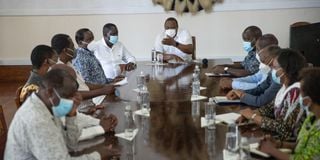Uhuru extends curfew, suspends public gatherings as Covid cases rise

President Uhuru Kenyatta (centre) during a meeting with various leaders in Mombasa on August 18, 2021. He extended the ongoing nationwide curfew for a further 60 days, citing escalating Covid-19 infections.
President Uhuru Kenyatta has extended the ongoing nationwide curfew for a further 60 days, citing escalating Covid-19 infections.
In a statement on Wednesday, the Head of State further lifted the differentiated curfew hours and specific restrictions for the previously identified Covid-19 hotspot zones of Kisumu, Siaya, Homa Bay, Migori, Busia, Kakamega, Vihiga, Bungoma, Kisii, Nyamira, Kericho, Bomet and Trans Nzoia counties. The counties will now observe the nationwide curfew prescriptions of 10pm to 4am.
President Kenyatta further suspended all physical public gatherings and meetings, including political rallies and campaign meetings for impending by-elections.
He urged Kenyans to strictly follow the Covid-19 containment protocols and get vaccinated following a spike of infections and deaths.
He was speaking when he met political party leaders led by opposition chief Raila Odinga (ODM), Kalonzo Musyoka (Wiper), Musalia Mudavadi (ANC), Gideon Moi (KANU) and Moses Wetang’ula (Ford Kenya) at State House in Mombasa. The Head of State discussed with the leaders the country's Covid-19 containment measures in light of the rising infections.
Go for vaccination
In a statement to newsrooms, State House Spokesperson Kanze Dena Mararo said the leaders agreed to encourage Kenyans to follow the Covid-19 containment measures and further go for vaccination.
The President said the interventions initiated to mitigate local community transmission of the virus have been effective in managing its impact on Kenyans, the healthcare systems and the economy.
“These interventions have been escalated, and de-escalated, based on feedback reports on infection rates, analysis of health system capacities, economic impact reports. The recently evaluated reports have pointed to an exponential rise in infection rates across several counties, occasioned by unrestrained gatherings and congregations, in breach of guidelines as issued by the Ministry of Health,” said Mr Kenyatta.
Counties’ positivity rate
He said that over the last one week, 18 counties have recorded a positivity rate above 20 per cent, with Kiambu, Nyandarua, Murang’a, Makueni, Machakos, Baringo, Meru, and Nyeri recording a positivity rate of above 30 per cent.
“Epidemiological studies and models indicate the presence within our borders of the Delta variant of Covid-19 which is more communicable and acute, and that ‘super-spreader’ events are likely to further imperil public health and exacerbate the coronavirus situation in our country,” he added.
He said stringent measures are required to bring down infection rates across the country, avert a national crisis and secure continuity of operations to avoid further adverse impacts.
Social gatherings, including weddings, celebrations of marriage or traditional unions, ceremonies of rites of passage, funeral and cremation ceremonies will strictly adhere to the 100-person attendance limit as prescribed, he said.
Funeral guidelines
“In addition to the prevailing guidelines on funeral or interment ceremonies, and to further enhance compliance with the guidelines, officiators and proprietors of funeral homes are to strictly adhere to the prescribed 96 hours of confirmation of death, and secure processing for burial within this period, failure to which appropriate action against management, staff, and premises shall be taken where exceptions are not justified,” he said.
Places of worship will continue to strictly adhere to the one-third rule for in person worship and congregational worship, and protocols on hygiene and social distancing in accordance with the guidelines of the Inter-Faith Council.
“The operations of bars, restaurants and eateries shall continue as guided by the Ministry of Health guidelines, failure to which appropriate action against management, staff, patrons, and premises shall be taken,” said Mr Kenyatta.
National government administration officers were directed to ensure compliance of the directives.
At the same time, all security sector agencies were directed to ensure organisers and individual leaders — including senior public sector officials and political leaders — take personal responsibility and are held to account for any violation of the control measures.





